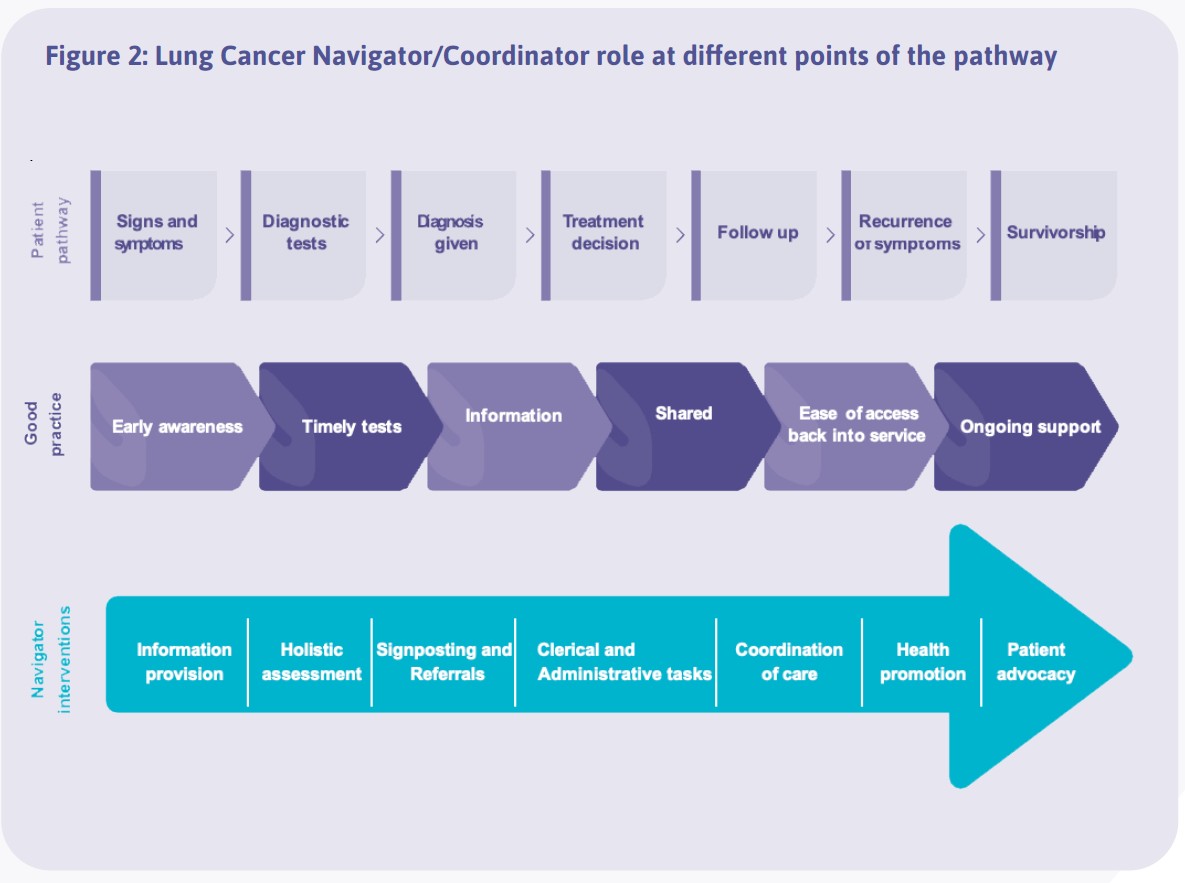Download the Navigator Professional Framework
Share your views
Lung Cancer Navigators/Coordinators are part of the wider cancer care team, and they act as a single point of contact and support for people living with cancer and their relatives and carers.
Lung Cancer Navigators/Coordinators work closely with the LCNSs to provide high-quality, patient-centered care for patients with a lung cancer diagnosis. Under the direction, guidance and supervision of the LCNSs, the Navigators/Coordinators are there to help coordinate care and support patients through clinical investigations, diagnosis, cancer treatment and beyond.
A Lung Cancer Navigator/Coordinator plays a vital role in:
- supporting patients through every stage of their cancer journey;
- acting as a liaison between patients, families and the healthcare team;
- ensuring that patients receive comprehensive, timely and well-organised care; and
- alleviating the workload of the LCNSs, allowing them to focus more on direct patient care and patients with more complex needs.
With approximately 49,200 people in the UK being told that they have lung cancer each year, and the new NHS 10-year Health Plan committing to increase screening for lung cancer (meaning this number is likely to increase), the role of Lung Cancer Navigators/Coordinators will become increasingly important.
This new LCNUK Professional Development Framework for Lung Cancer Navigators/Coordinators is intended to guide Lung Cancer Navigators/Coordinators, their line managers and employers on the core skills, knowledge and training that they will gain and demonstrate as they progress in the role.
Our goals
To support:
- those aspiring to become Lung Cancer Navigators/Coordinators understand the qualifications, skills and capabilities required to support patients and services in the role.
- existing Lung Cancer Navigators/Coordinators consider their priorities for professional development and having conversations with their managers about this.
- line managers, in aiding conversations with their staff members about their current competencies, professional development priorities and career goals.
- employers to understand the Lung Cancer Navigator/Coordinator role and how it can support better service delivery and lung cancer care and outcomes.
- policy makers and their understanding of the Lung Cancer Navigator/Coordinator role and how it contributes to improving service delivery, better outcomes and delivery of the new NHS 10-year health plan: Fit for the Future.
The framework includes information on what LCNUK feel are the four pillars of the Lung Cancer Navigator/Coordinator role and key components of the role.

MANAGING THE PATIENT PATHWAY
The role of a Lung Cancer Navigator/Coordinator is still relatively new. There is no unified job description of the role, and it can vary depending on individual hospital Trust needs. The role of a Navigator/Coordinator is to facilitate patients’ investigations including collaborating with other areas/Trusts to ensure movement through the pathway in a timely manner and beyond, depending on Trust policy, and improving the lung cancer diagnostic pathway in terms of tracking every stage of the pathway, patient outcomes and experience, service delivery and system efficiency.
The Lung Cancer Navigator/Coordinator role constantly evolves. They are continuing to learn, develop and adapt their skills and communicate effectively with others – both patients and colleagues.

ACCESS TO A LUNG CANCER NAVIGATOR/COORDINATOR IS CRITICAL TO PATIENT SAFETY, OUTCOMES AND EXPERIENCE
The importance of patients having access to Lung Cancer Navigator/Coordinator support from the earliest possible stage is very beneficial to both patients and their families. The pathway Navigator/Coordinator will meet the patient once they have been referred for investigations and support them up to the point of diagnosis. Each pathway Navigator/Coordinator will work in a slightly different way in different Trusts.
Why does access to a Lung Cancer Navigator/Coordinator matter?
Put simply, LCNUK feels that “patients with a Lung Cancer Navigator/Coordinator working alongside a LCNS are more likely to get access to treatment with clear consequences for their chances of survival as well as a more positive experience of care if they are supported by a Lung Cancer Navigator/Coordinator”.

